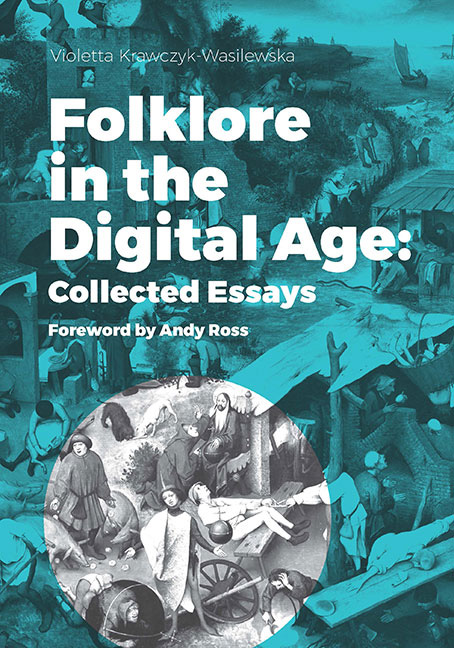Book contents
- Frontmatter
- Contents
- Acknowledgements
- Foreword
- I The Art of Bruegel and the Folklorist
- II e-Folklore as a Part of Digital Culture
- III Towards a Digital Folklore Heritage
- IV Post September 11: Global Fear vs Digital Humour
- V The Haiti Legends Revisited and the Power of e-Rumour
- VI The Global Dating Phenomenon
- VII Matchmaking through Avatars: Social Aspects of Online Dating
- VIII The Global Food Story and the Internet
- Bibliography
- Miscellaneous Endmatter
IV - Post September 11: Global Fear vs Digital Humour
Published online by Cambridge University Press: 22 December 2017
- Frontmatter
- Contents
- Acknowledgements
- Foreword
- I The Art of Bruegel and the Folklorist
- II e-Folklore as a Part of Digital Culture
- III Towards a Digital Folklore Heritage
- IV Post September 11: Global Fear vs Digital Humour
- V The Haiti Legends Revisited and the Power of e-Rumour
- VI The Global Dating Phenomenon
- VII Matchmaking through Avatars: Social Aspects of Online Dating
- VIII The Global Food Story and the Internet
- Bibliography
- Miscellaneous Endmatter
Summary
On September 11, 2001 terrorists (19 of them), associated with the Islamic extremist group al-Qaeda, hijacked four airliners and carried out massive suicide attacks against American and international symbols of the ‘free world’ in the United States. Two of the planes (the first at 8:45 a.m., the second at 9:03 a.m.) were flown into the twin 110-floor skyscrapers of the World Trade Center in New York City. A third plane hit the Pentagon just outside Washington D.C. at 9:55 a.m., and the fourth crashed at 10:10 a.m. in a field in Pennsylvania. The attacks resulted in over 3,000 people killed and over 10,000 injured, including police officers and firefighters. Both of the towers subsequently collapsed, which in turn threw a cloud of debris onto the surrounding New York streets and buildings. In memory of the victims of the attack, the 9/11 Memorial and Museum were built and new buildings have been erected at the site of the former World Trade Center.
The tragedy of September 11th was a shock for people all over the world. It triggered the war against terrorism, which in turn caused an intensification of the problems connected with terrorism, defined as “an international use of violence or a threat to use violence in order to achieve political change”. The issue of terrorism became a permanent topic of discourse for the US government, as well as for politicians, scholars and scientists, mass-media, and the general population in day to day conversations.
Both terrorism and globalisation are concepts in political scholarship that evoke not only the widest discussions, but also the sharpest disagreement. In the late 1990's there were already many largely differing approaches among influential authors to the problem (e.g. Giddens versus Appadurai). Nevertheless, much criticism has concentrated on the alleged cultural hegemony of the Western world, as underlined by Samuel Huntington's prophetic study, The Clash of Civilisations. Globalisation, treated primarily as a liberal Westernisation / Americanisation of the globe, may be perceived as a spread of Western values, ways of life and ideas (e.g. free market economy, democracy, human and women's rights, consumerism, secular state, a.s.o.) to the rest of the world, in a fashion which shows disregard for deep cultural and ethnic differences between western and non-western societies.
- Type
- Chapter
- Information
- Folklore in the Digital Age: Collected Essays , pp. 57 - 68Publisher: Jagiellonian University PressPrint publication year: 2016



